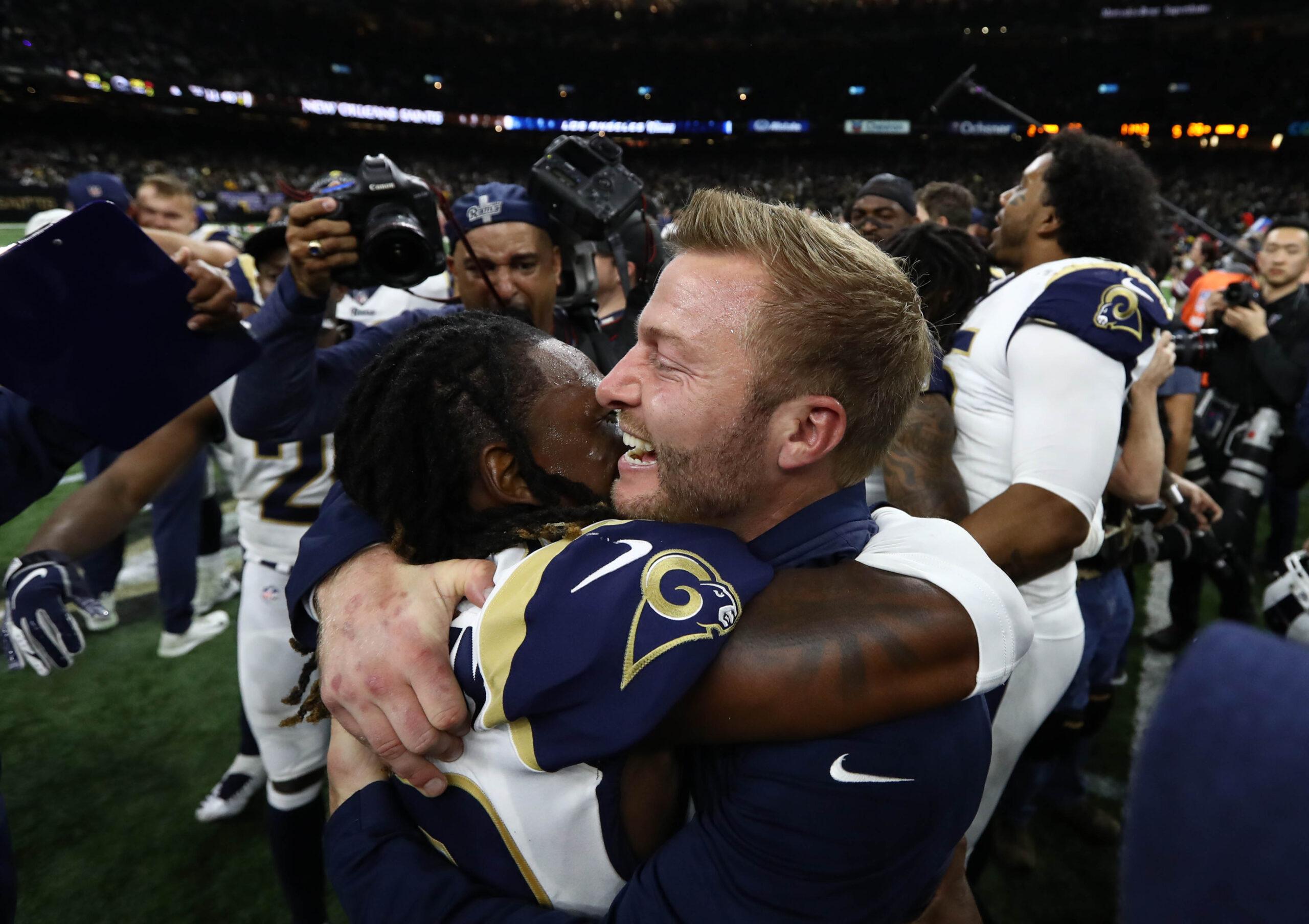
Two seasons ago the Rams were coached by Jeff Fisher, had the 32nd-ranked scoring offense, 23rd-ranked scoring defense, the worst rookie QB in recent NFL history, and won four games. Some 24 months later, L.A. is now coached by Sean McVay, has the no. 2 scoring offense, are helmed by one of the most promising young QBs in the league, had 13 regular-season wins, and are going to Atlanta for Super Bowl LIII. It’s been a wildly improbable, meteoric rise for the Rams, a journey that was perfectly encapsulated by the team’s equally improbable 26-23 overtime win against the Saints in the NFC championship game. The Rams came out flat, couldn’t handle the deafening crowd in the Superdome, and found themselves in a 13-0 hole early (and they were lucky it was only 13 points). But in the final frame, everything seemed to break right for the Rams—including one of the most inconceivably bad no-calls in NFL history (we’ll get to that). Here is a rundown of the seven things that happened in the final few minutes that allowed L.A. to overcome the odds and earn a trip to the title game.
Drew Brees Misses Ted Ginn Jr. on Third-and-17
With just over 11 minutes left and a 20-17 lead, the Saints had a chance to put together a scoring drive that could put the game nearly out of reach for the Rams. New Orleans was dominating the field-position battle and started this possession with the ball on the Rams’ 46-yard line after stifling the backed-up L.A. offense. But a holding penalty on first down backed the Saints up, and the team got little going on the next two downs. New Orleans faced a third-and-17, an ultra-difficult down-and-distance. If anyone can pick up that first down, though, it’s Brees and New Orleans. Then this happened:
Brees just missed—and it probably should have been picked. Off-target throws like this one are rare for the quarterback who just set the single-season completion percentage record, but Brees just throws it behind Ginn, and the Saints were forced to punt.
The Rams Kick a Field Goal Deep in the Red Zone
On the ensuing drive, Jared Goff and the Rams offense put together their masterpiece, going 85 yards on nine plays. Goff hit Gerald Everett for 39 yards on a third down and then Josh Reynolds for 33 as the Rams matriculated the ball down the field.
Well, it would have been their masterpiece if it had ended in a touchdown instead of a field goal. One play after Goff failed to turn on the jets (well, what jets he has) on a rollout that he likely could have ran into the end zone, McVay made a critical error: Facing fourth-and-goal on the 1-yard line and trailing 20-17, he elected to kick a field goal. (The attempt would come from the 6 after a 5-yard delay-of-game penalty.) Most head coaches would take the points to tie the game as McVay did, but it’s an analytical error:
If McVay had gone for it, his team could’ve gone up by four and put Brees and Co. in a touchdown-or-bust situation with about five minutes left on the clock. And if the Rams had failed to convert, they would have given the Saints a 99-and-a-half-yard field to deal with. Instead, with the game tied, the Saints just needed to take time off the clock and prepare for a would-be game-winning field goal. They nearly did just that.
Brees’s Incomplete Pass to Michael Thomas
The Saints quickly moved the ball into the Rams’ side of the field with the help of a 43-yard floater that somehow found its way to Ted Ginn:
With the ball on the Rams’ 13-yard line and the score all tied up at 20, the Saints just needed to burn enough clock before attempting a field goal. A conversion would all but end the game, and the Saints got aggressive, with Brees throwing a quick pass to Thomas on first down. The pass was low, and it hit the ground before Thomas could reel it in.
This is exceedingly rare: Thomas made a catch 85 percent of the time when he was targeted this season. And a short route like the one Brees threw should have been automatic. But it was off-target and it stopped the clock, allowing the Rams to preserve their two timeouts. The Saints could still run out some time (their next play was an Alvin Kamara rush for no gain), but they never picked up a first down because …
The Referees Miss a Pass-Interference Call on Nickell Robey-Coleman
This play changed the game. Put an asterisk on the Rams’ win if you want, because if the officials threw a flag on this play, the game would almost certainly be over—all the Saints would have needed to do was take a few knees to burn the clock before kicking a gimme field goal.
Hell, this even looks like a helmet-to-helmet hit. The NFL is already expected to admit it was an error:
I’d call this an unbelievable stroke of luck for the Rams, but it wasn’t really luck—it was just bullshit.
The Rams’ 48-Yard Field Goal to Force Overtime
Goff and the Rams offense got the ball back with 1:41 left on the clock after a Wil Lutz field goal gave the Saints a 23-20 lead. Goff went to work, hitting Josh Reynolds, Brandin Cooks, Robert Woods, and Todd Gurley for completions to move the ball downfield while managing a ticking clock and an unbelievably loud environment with just one timeout. But the attempt they got was no gimme.
NFL kickers only made 64.6 percent of 48-yard field goals over the last five seasons, though Rams kicker Greg Zuerlein has hit on 18 of 25 attempts from the 45-to-50-yard range over that time frame. This kick needed every inch to squeak inside the upright:
The John Johnson III Interception
After Zuerlein’s kick, the Saints took a knee to send the game to overtime. They won the coin toss, giving them a better-than-even chance of winning: The team that wins the coin toss in OT wins the game about 55 percent of the time (excluding ties). All New Orleans had to do was drive down the field for a TD. But on a second-and-16, Rams pass rusher Dante Fowler Jr. got pressure, and everything unraveled:
Brees threw only five picks in the regular season, putting together his most efficient passing performance (by passer rating and adjusted net yards per attempt) of his career. This ball hangs in the air for a decade before softly falling into the stomach of Rams safety John Johnson. And it’s his literal stomach—he’s falling backward as he makes the awkward grab.
The 57-Yard Field Goal to Win
On the ensuing drive, the Rams gained just 15 yards. Their play-calling was oddly conservative: Goff threw a 12-yard pass to Tyler Higbee on first down, they ran with C.J. Anderson for a loss of 3 on the next play, and then Goff gained 6 yards on another pass to Higbee. On third-and-7, rather than pushing the ball downfield, the Rams ran a quick bubble screen to Robert Woods, but the pass fell incomplete. That gave Zuerlein a long, long field goal attempt to win.
Over the past five seasons, NFL kickers hit on 50.4 percent of field goal attempts of 56 yards or more. Again, Zuerlein is a tick better over that span, but he sits at just 55.6 percent. A miss would have meant giving the Saints the ball back with a short field. But Zuerlein drilled it, and the Superdome went quiet:
Add all this up, and what are the chances that the Saints offense stalls in the fourth quarter, the Rams play conservatively down the stretch, Brees misses a gimme throw to Thomas, the refs miss a no-brainer pass-interference call, L.A. forces a wild overtime interception, and the Rams hit on two long field goals? The Rams needed every single one of these things to happen, or it would be the Saints heading to Atlanta in two weeks. Just like the Rams’ rise from the NFL gutter to the upper echelon of the sport has been wild and unlikely, so too was their win over the Saints.

